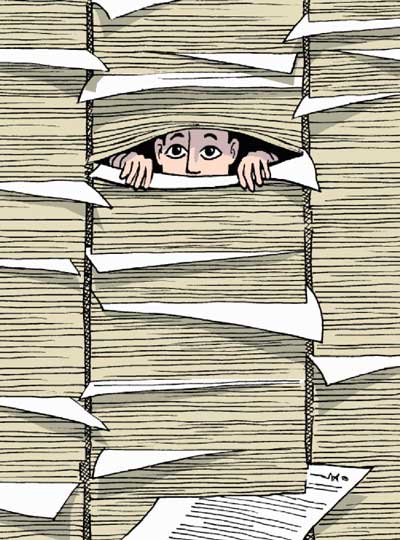
The term “bureaucracy” is often associated with the notion of quiescent and scandalous corruption on the government’s part. Americans seem to have an easier time accepting and promoting the idea that bureaucrats are inactive yet overly paid, than believing the more realistic portrayal of hardworking individuals who are simply caught in the slow process of achieving change. While the bureaucratic system in the United States is constantly expanding and does have its flaws, it plays a vital role in enforcing the rules and regulations passed by Congress and signed by the president.
The bureaucracy is part of the executive branch — it is theoretically an extension of the presidency, working to enforce the measures both the president and Congress have passed and express the entire presidential administration’s standards. Change cannot truly emerge without the aid of an administrative system that works to progress the nation by shaping and overseeing its policies. Implementation, in theory, is necessary for any democratic nation to truly succeed in offering the aid of certain governmental programs for those who seek them. Even those who do not desire a department that overlooks their personal or professional concerns are coerced into following its guidelines, as set forward by the federal government.
These bureaucrats are essentially the main forces ensuring an effective method of unified communication and enforcement for the American people. In a nation as diverse, multicultural and dynamic as the United States, a bureaucracy just as large is needed to fully ensure governmental policies are correctly implemented. From healthcare and environmental protection to intelligence and military, the nation is in need of all the many agencies that make up the core of the bureaucracy.
 If a progressive agenda is to be put in place, it is expected that the number of agencies and governmental programs be at least maintained in size and number, if not altogether expanded. Conservatives may argue that there are too many unneeded agencies, but each agency does actually have its own purpose and was created for a legitimate reason.
If a progressive agenda is to be put in place, it is expected that the number of agencies and governmental programs be at least maintained in size and number, if not altogether expanded. Conservatives may argue that there are too many unneeded agencies, but each agency does actually have its own purpose and was created for a legitimate reason.
After an agency takes on a role and shapes its influence, it is very difficult to take away the legitimacy of that agency because it has proven to ensure that the specific department it is under functions properly. In essence, a bureaucracy is the part of government that allows the true impact of governmental action to unfold.
Criticisms of Bureaucracy Explained
Although the bureaucracy is a necessary component of the United States government because of the purpose it has in advancing the agenda of the president and Congress, critics argue that the bureaucracy is too big and does not need to be as structured and slow as the system encourages. Red tape is a feature of the bureaucracy that is often a criticism of the entire structure, as it represents the slow nature of initiating change. Since there are many components to a bureaucracy, the process is a long one that requires a series of steps and determination.
In essence, critics claim that this process is too intricate and can easily be simplified by cutting down the size of the bureaucracy. Another criticism of bureaucrats has to do with their very function in administering and enforcing programs. Conservatives especially claim federal workers are not needed since the government hires workers at more localized levels. They believe that with 16.2 million state and local government workers, the federal government does not need to hire approximately 4.05 million workers to carry out its policies.
Need for Bureaucracy Explained
But in reality, the bureaucracy is an additional set of workers who work solely for the federal government and are doing work that allows workers at the local and state level to focus more on the specific regions in which they are implementing certain initiatives. Other opponents target federal mandates specifically, as they claim they are another way of expanding the bureaucracy unofficially with laws that require state and local government workers to carry out federal directives.
Regardless, the bureaucracy does have tangible flaws, as duplication and conflict is a result of the inefficiency brought on by a large bureaucracy with a multitude of components. Duplication is essentially the direct impact of this unique structure, since certain agencies do the same exact work, or very similar. Conflict is the result of duplication, since the agencies that do the same work may contradict one another. For instance, the Agricultural Research Service tells farmers how to grow crops more efficiently, while the Agricultural Stabilization and Conservation Service pays farmers to grow fewer crops. The last main critique of bureaucracies is their imperialistic nature and their tendency to waste money without increasing production or productivity.
In my opinion, bureaucracies are necessary and vital. All government programs and agencies have a function, and no matter how efficient they are, they play an important role for the American public. The system puts in place a slow process, but that does not mean the bureaucracy is incapable of achieving its goals. Congress and the president have the power to influence the bureaucracy, and essentially, they are the forces that may carry corruption over to federal workers. Congress accepts unofficial agreements with interest groups and lobbyists, while the bureaucracy only directs the nation in the way that is demanded of it.
All heads of departments and agencies are chosen by the leader of this nation and approved by the Senate, which means that they are qualified, decent beings with positive intention. Also, the nation is constantly expanding, which means the bureaucracy needs to grow with the change in ideas, people and infrastructure. While I do believe local and state workers are also necessary for fulfilling federal initiatives, claiming that the bureaucracy is not needed because of these workers is irrational.
In fact, these workers are completing only a quarter of what federal workers do on a daily basis. Therefore, federal workers are just as, if not even more, important than other government workers. The concept of taking over tasks that the bureaucracy completes to lower levels of government itself proves how important the bureaucracy is in setting the nation in the right direction.
It is an undeniable fact that bureaucrats carry out the tasks that the nation needs to progress. The state and local governments are responsible only for specialized work within the region that is being represented, and oftentimes are not focused on enforcing federal initiatives throughout the nation. The system may be slow and tedious, but it is the only way for a truly effective government to emerge. At the end of the day, the slow, consistent turtle wins the race.
Leave a Reply